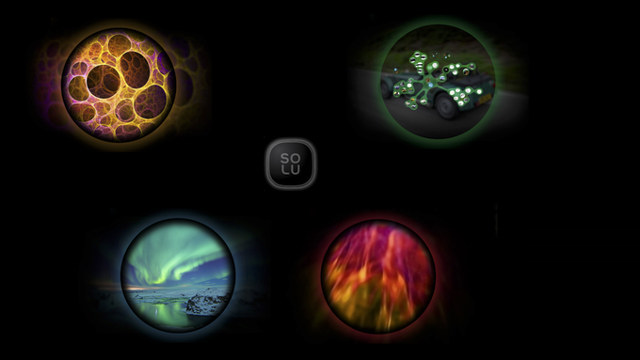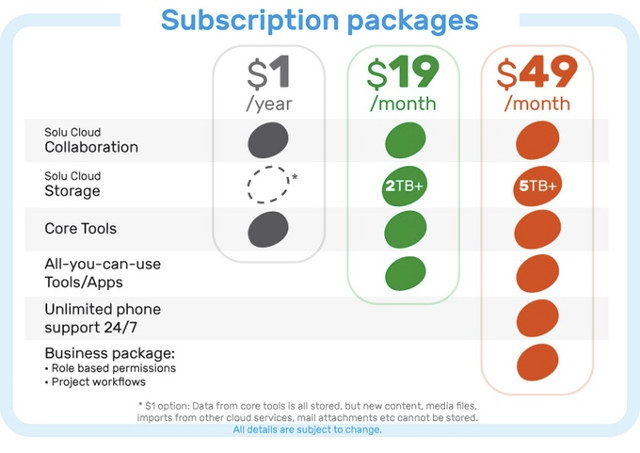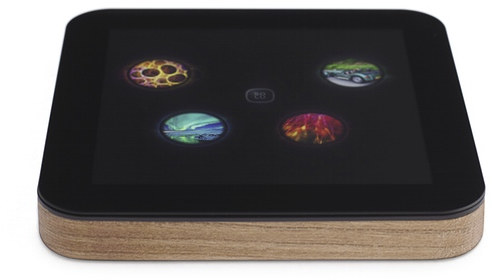Solu Machines, has startup based in Finland, as decided to re-invent the computing experience. To achieve this they’ve created a battery powered mini PC based on Nvidia Tegra K1 processor and 4GB RAM, included a touch screen on the top cover that can be used as a tablet on the go, and as a touchpad when connected to a monitor, while creating a new OS called SoluOS with a new type of user interface and that stores lots of the data in the cloud, yet allows the device to run offline, and there’s more…
- SoC – Nvidia Tegra K1 4-Plus-1 ARM Cortex-A15 CPU @ 2.3GHz with 192-core Kepler GPU
- System Memory – 4GB LPDDR3
- Storage – 32GB “cache capacity”
- Display – 1440 x 1440, 450ppi, with an edge-to-edge touch
- Video Output – Support for up to 4K monitors apparently via USB type-C connector
- Connectivity – Dual-band 2×2 MIMO WiFi (802.11a/b/g/n), Bluetooth 4.0
- Battery – 1200mAh
- Dimensions – 102 x 102 x 13mm
 What you see above is the “home screen” or “desktop” however you want to call for SoluOS, which looks quite different from the usual list of icons we see on most platforms. Solu is also designed for collaboration, and multiple users can work on the same file using a “Causal Tree” technique.
What you see above is the “home screen” or “desktop” however you want to call for SoluOS, which looks quite different from the usual list of icons we see on most platforms. Solu is also designed for collaboration, and multiple users can work on the same file using a “Causal Tree” technique.
SoluOS operating systems is based on Linux, and works with SoluCloud which offers up to 5TB or more storage in the cloud, as well as unlimited access to apps, including Android apps. This is achieved via a monthly fee used to support the Cloud, and pay app developer a share of the profit based on usage.
 You can pay as low as $1 per year, but you won’t have access to Cloud Storage for your own data, while $19 per month will give you access to 2TB+ cloud storage, and all apps in the system, while a $49 monthly fees to targetting businesses with unlimited phone support, 5TB+ storage and some other features. The company is also said to work on a free subscription plan, although $1 per year is already close to free…
You can pay as low as $1 per year, but you won’t have access to Cloud Storage for your own data, while $19 per month will give you access to 2TB+ cloud storage, and all apps in the system, while a $49 monthly fees to targetting businesses with unlimited phone support, 5TB+ storage and some other features. The company is also said to work on a free subscription plan, although $1 per year is already close to free…
https://www.kickstarter.com/projects/676993694/solu-a-new-breed-of-computing
Solu project is now on Kickstarter and it’s surprisingly popular having nearly reached their 200,000 Euros funding target with about 185,000 Euros raised so far. The early bird rewards are gone, but you can still pledge 349 Euros ($384 US) to get a Solu mini PC with a charger and three month subscription. Solu will only ship to North America and Europe for 20 Euros, and delivery is scheduled for May 2016. You can also visit Solu.co for more pictures and details.
Via Linux.com

Jean-Luc started CNX Software in 2010 as a part-time endeavor, before quitting his job as a software engineering manager, and starting to write daily news, and reviews full time later in 2011.
Support CNX Software! Donate via cryptocurrencies, become a Patron on Patreon, or purchase goods on Amazon or Aliexpress





